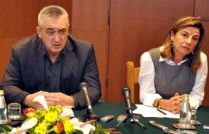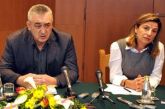- Serbia
Get to know Serbia
- Citizens
Culture and science
Health services
Pension and disability insurance
- Business
Employment
Economy
- Media
- Government
- Contact
Keep in touch
Contact form
Back
Keepin touch
Whether you have a question, comment, suggestion or any problem in the purview of the government, send us your message and we will try to respond as soon as possible. If your problem is not in our purview, we will forward your message to the relevant institution.
Q:
A:
Active role of ICMP in investigating organ trade in Kosovo
Belgrade,
17 February 2011
President of the Serbian Committee for Missing Persons Veljko Odalovic stated today that a more active role of the International Commission on Missing Persons (ICMP) is required in investigations into human organ trade in Kosovo-Metohija.
Odalovic told a press conference, following a meeting with ICMP Director Kathryne Bomberger, that data bases on blood and bone marrow samples are with the ICMP, adding that the remains of the victims must be found, indentified and corelated to the perpetrators, which will be a key element of the upcoming investigation.
Over 14,000 people in the region are registered as missing persons, a fact deserving of the attention of all who are involved in this process and have been given a mandate by their states to tackle this issue, he added.
One of the key problems is the unsolved case of over 400 bodies that have been in the Pristina morgue for ten years and which cannot be identified, Odalovic said.
There are bone marrow samples, but no matches with blood samples from relatives of missing persons.
Odalovic stressed that Serbia approached the missing persons issue in a responsible manner and responded to every demand – in terms of supplying documentation, any information it has or by exhuming bodies and searching central Serbia as demanded by the Pristina delegation.
We must establish full cooperation with institutions dealing with this process in Kosovo-Metohija, Odalovic noted, adding that a meeting between EULEX and the ICMP is necessary in order to clarify any misunderstandings or misinterpretations regarding the reports of these two institutions.
Bomberger stressed that the process of identifying the remains of missing persons in Kosovo-Metohija has come to a stall, adding that apart from not being able to match the samples of remains with blood samples of victims’ relatives, the number of mass graves has decreased from 2005 and thus also the number of exhumed bodies.
One of the possible reasons for the current stall are misidentifications that were announced in the period before DNA tests were used, and the other may be the fact that some of these remains do not belong to persons killed during this conflict.
Over 14,000 people in the region are registered as missing persons, a fact deserving of the attention of all who are involved in this process and have been given a mandate by their states to tackle this issue, he added.
One of the key problems is the unsolved case of over 400 bodies that have been in the Pristina morgue for ten years and which cannot be identified, Odalovic said.
There are bone marrow samples, but no matches with blood samples from relatives of missing persons.
Odalovic stressed that Serbia approached the missing persons issue in a responsible manner and responded to every demand – in terms of supplying documentation, any information it has or by exhuming bodies and searching central Serbia as demanded by the Pristina delegation.
We must establish full cooperation with institutions dealing with this process in Kosovo-Metohija, Odalovic noted, adding that a meeting between EULEX and the ICMP is necessary in order to clarify any misunderstandings or misinterpretations regarding the reports of these two institutions.
Bomberger stressed that the process of identifying the remains of missing persons in Kosovo-Metohija has come to a stall, adding that apart from not being able to match the samples of remains with blood samples of victims’ relatives, the number of mass graves has decreased from 2005 and thus also the number of exhumed bodies.
One of the possible reasons for the current stall are misidentifications that were announced in the period before DNA tests were used, and the other may be the fact that some of these remains do not belong to persons killed during this conflict.
-
 Belgrade, 22 January 2025
Belgrade, 22 January 2025Egypt one of Serbia’s closest partners on international stage
-
 Belgrade, 9 July 2024
Belgrade, 9 July 2024Support for 104 associations in diaspora that preserve Serbian language, culture
-
 Belgrade, 15 April 2024
Belgrade, 15 April 2024Competition for StarTech grants open until 31 May
-
 Belgrade, 2 October 2023
Belgrade, 2 October 2023Serbia respects Resolution 1244 and will do everything to preserve peace
-
 Belgrade, 13 September 2023
Belgrade, 13 September 2023Day of Serbian Unity to be celebrated outside borders of Serbia, Republika Srpska for the first time
-
 Belgrade, 8 August 2023
Belgrade, 8 August 2023RSD 24.2m in state aid paid out to citizens affected by storm
-
 Belgrade, 17 June 2023
Belgrade, 17 June 2023Belgrade is doing everything to preserve peace in Kosovo and Metohija
-
 Belgrade, 15 June 2023
Belgrade, 15 June 2023Slovenia will continue to support Serbia on its way to EU
-
 Belgrade, 5 May 2023
Belgrade, 5 May 2023Emergency measures, tightening of conditions for possessing weapons
-
 Belgrade, 3 May 2023
Belgrade, 3 May 2023Three days of mourning in Serbia over tragedy at Vladislav Ribnikar primary school


